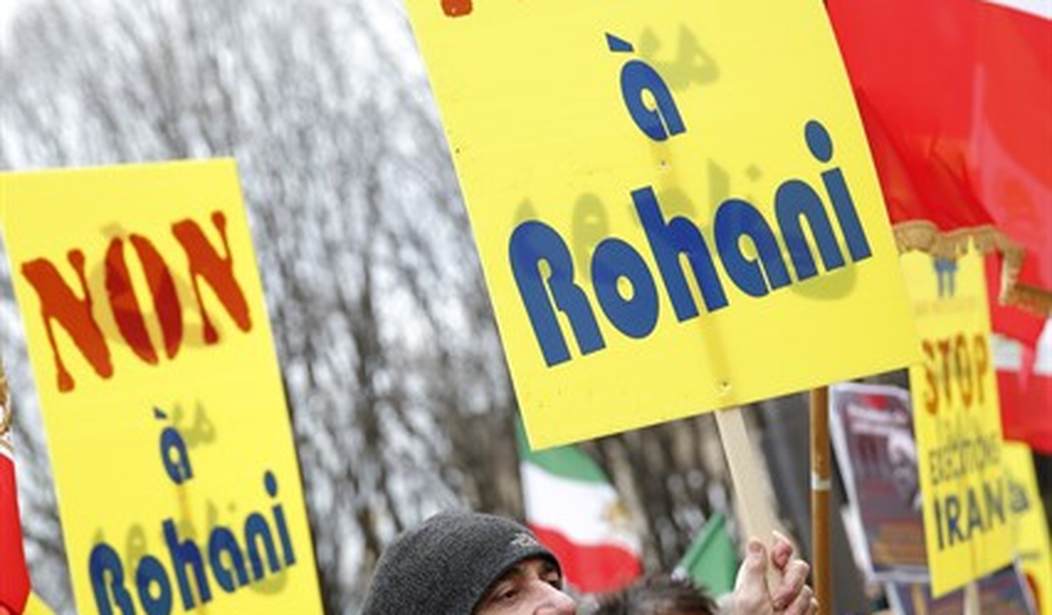In the history of international diplomacy quite frequently have been moments when the phone rings and an ambassador is immediately summoned to the host country’s foreign ministry. Those calls always convey a clear message: The host country feels there is a pressing issue that requires the top envoy’s immediate attention.
In the hot afternoon on July 13, Tehran’s foreign ministry hastily summoned the Italian ambassador over a visit to Rome by Maryam Rajavi, the President-elect of the National Council of Resistance of Iran (NCRI). A profoundly irate Tehran fumed, screamed, and vowed there would be consequences for the visit.
Rajavi, who resides in Paris, was in Rome upon the invitation of cross-party members of the Parliament. She addressed a major meeting in the Chamber of Deputies, and was also a guest of the respected liberal-oriented think-tank “Luigi Einaudi Foundation”.
Members of parliament rebuffed Tehran’s summons. The Italian Foreign Minister, while underscoring that Mrs. Rajavi was not the guest of the Italian government, stressed that Italy is a democracy.
In the wake of this correct and principled position, the dust may have settled for the time being, but questions remain. What prompted Tehran to take such a dramatic action, what does it signify, and what are the lessons?
Rajavi’s visit took place in the aftermath of a months-long uprising in Iran, which took the regime to the brink of overthrow. A network of resistance units affiliated to the People’s Mojahedin Organization of Iran (MEK), the main constituent of the NCRI’s coalition, played a key role in organizing and leading the protests.
Tehran has failed to restore the status quo despite numerous arrests. It is clear to the regime as well as the activist community that further unrest could break out at any time.
Recommended
That possibility was highlighted on July 1, when hundreds of political dignitaries from the US, Canada, Europe, and the Middle East gathered at the NCRI’s headquarters north of Paris to express solidarity with the Iranian people’s push for regime change and democracy. The former US Vice President, Mike Pence (a candidate for the 2024 election), former UK Prime Minister, and Liz Truss were among dignitaries who took part. Just ten days ahead of the meeting in Rome, dozens of Italian politicians took part.
In May and June, a majority of Italian members of Parliament (307 over 600, involving 104 Senators and 203 Deputies) showed support for the Iranian Resistance by signing onto Mrs. Rajavi's 10-point plan, a blueprint for a democratic Iran, and calling for designation of the Revolutionary Guards (IRGC) as a terrorist organization.
These actions mirror a broader global consensus. Over 3,600 lawmakers from 40 countries have signed identical initiatives, including majorities in the US, UK, and France. This vast solidarity underscores the growing recognition of Mrs. Rajavi and the NCRI as a democratic alternative to the current Iranian regime.
Rajavi’s visit to Rome thus rang an alarm bell for Tehran. The regime sensed that the visit could catalyze a monumental shift in global attitudes toward Iran.
The discussions in the Italian parliament centered on Iran's future, and the need for Europe and EU member States to quickly change their attitude towards the Iranian regime.
Mrs. Rajavi’s vision resonated with both the urgency of the situation and the deep-seated aspirations of the Iranian people.
“Today, I stand before you to urge the Parliament, the people, and the government of Italy to adopt this rightful and principled policy, which recognizes the Iranian people's struggle to overthrow the religious dictatorship. The Iranian people’s uprising represents the enduring legacy of the Resistance movement, which began over four decades ago in opposition to the regime. The active participation of women in this uprising is a product of the heroic struggle of Iranian women throughout the past 40 years,” Rajavi said.
Noteworthy among the attendees was former UK House of Commons Speaker John Bercow. Known for his stalwart advocacy for human rights and democracy, Bercow hit a key point. For years Tehran pushed a narrative that “there is no alternative” to the ayatollah’s regime. Bercow stressed that it is time to see the reality that there is a viable alternative in the NCRI and Mrs. Rajavi. He stressed the need for the West to reject appeasement once and for all.
As the world grapples with all the troubles and threats that the ayatollahs have been making for years, compounded by their support for Russia’s war on Ukraine, the Italian experience shows the West should stand firm, push back against ayatollahs’ threats and intimidation, and support the struggle of the Iranian people, who are driven by an organized resistance movement, which in turn is now endorsed by some global players.
The voice of the Iranian people is being heard much louder than ever before. It demands a secular, democratic republic, that rejects all forms of dictatorship, and commits to a future where no individual is privileged over others because of religion or birthright. A new Iran is possible. The attendees at the Rome meeting knew it, and by summoning the Italian Ambassador, the mullahs signaled that they knew it too.
Guilio Terzi is a former foreign minister of Italy.
























Join the conversation as a VIP Member